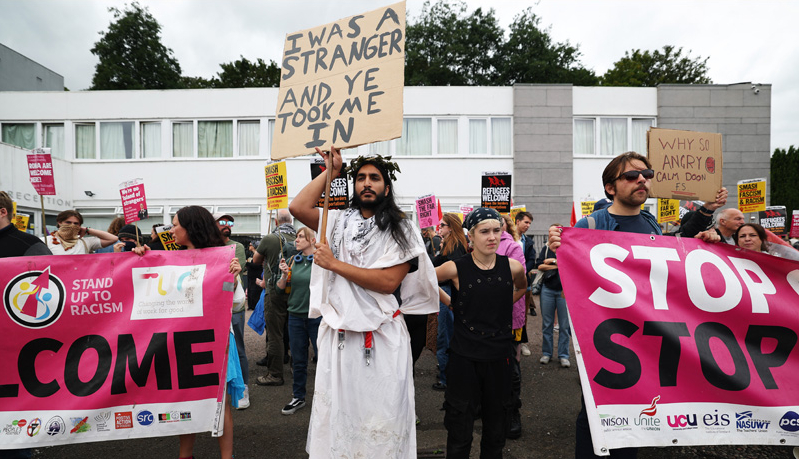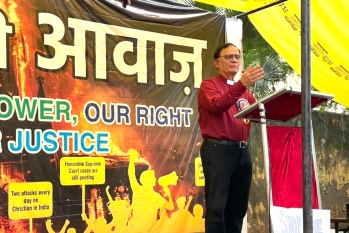
It seems like everyone in the UK is talking about migration at the moment. Can we find common ground and move towards solutions that work—especially for the most vulnerable groups?
According to the YouGov polling tracker, migration is topping the UK’s issues of concern for the first time since 2015. Whether it’s over flags, hotels, small boats or violent crime, everyone has something to say or a problem to posit.
How do we navigate the conversation around migration in constructive and honoring ways, resisting the persuasiveness of soundbites and the power of knee-jerk emotivism?
But when it comes to listening to voices articulating viable solutions or framing the debate in ways I can get on board with, it feels like all I’m hearing is tumble weed blowing in the wind. So I’m left wondering: how do we navigate the conversation around migration in constructive and honoring ways, resisting the persuasiveness of soundbites and the power of knee-jerk emotivism?
The migrant conversation in the UK is controversial because it hits all the core aspects of being human in conflicting and contradictory ways. The "Being Human" lens reminds us that all of us are made in the image of God, and speaks to four core aspects of humanity: significance, connection, presence and participation.
Migration hits them all. When it comes to migration, the dignity of the individual and their right to life, safety, family and a future are pitted against the value of community, the importance of culture and the significance of a sense of familiarity and home. The intersection of identity, relationships, purpose and place all converge and compete for precedence.
Family visa applications for refugees in the UK have seen a five-fold increase in less than two years.
This week we saw the UK government try to stem the tide of discontent with voters as Yvette Cooper announced an overhaul of current rules for family reunion applications. The immediate challenges facing our government are significant. Family visa applications for refugees (those granted asylum in the UK) have seen a five-fold increase in less than two years, from 4,300 to 20,600.
Families are arriving quicker than before Covid and local councils are having to house an ever-increasing number of refugee families at risk of homelessness. But is this change of behavior an indication of migrant opportunism, or is it because these families’ survival in their home countries is in such jeopardy?
It’s worth noting that these changes aren’t aimed at asylum seekers or economic migrants. These changes affect those who have been granted refugee status. In other words, the UK government agrees that they are legally fleeing persecution, war or conflict. It’s reasonable to assume that the risks the refugees faced are still being faced by their families.
93% of all refugee family visas in the UK are granted to women and children.
Charities are warning that without viable legal routes, desperate families will embark on dangerous alternatives to be reunited with their loved ones, and that these changes will disproportionately impact those who are typically the most vulnerable in a conflict—namely women and children (one half of the quartet of the vulnerable, repeatedly highlighted in the Old Testament as the people groups God aligns himself with in terms of justice and advocacy). 93% of all refugee family visas in the UK are granted to women and children, and the announcement this week suggests that they will now have to wait two years before they can travel to the UK legally.
However, this context does not detract from the political size and the financial scale of the migrant headache facing the government. Increasingly vocal communities are voicing their displeasure at the use of hotels in their localities.
The backlog of cases means appeals alone are taking over a year to be heard. All the while, asylum seekers can’t work and can’t travel; they just wait in a hotel with a load of other bored men (and the majority are men). And bored, traumatized, purposeless men never cause problems for anyone!
Now violent crimes against woman and children are being reported in local and national media. Those stories are then in turn used to stir up fear and wariness against immigrants in general.
Women and children have become the lightning rod for many sides of the debate.
In short, women and children have become the lightning rod for many sides of the debate— protecting our own families versus championing the needs of the most vulnerable strangers. Which leads me full circle to my original question: how do we as Christians navigate this? There are no easy answers.
But I wonder if part of the issue is we have stopped listening out for the validity of the opinions of those we disagree with. In conflict resolution, parties are encouraged to see problems not as mutually exclusive, where one wins and the other loses, but rather as shared problems to be creatively solved together.
How much of our conversation on migration is being framed as an argument to be won or lost? Instead it could be framed as part of a set of issues to be creatively explored—explored in ways that honor and affirm the image bearing nature of our humanity, seeking after the humanness of significance, connection, presence, and participation as a whole, and not rival parts.
Originally published by Being Human. Republished with permission.
Jo Frost is director of communications and engagement, Evangelical Alliance of the United Kingdom, leading the communications, membership and mission teams, as well as co-directing the Being Human project with Peter Lynas. She previously worked with a number of Christian charities. With a Master’s degree in Public Communications, she has a background in international human rights and environment campaigning. Jo has also been involved in church leadership for over 20 years, serving on leadership teams as well as helping planting churches in London and in France. She teaches, writes and preaches regularly on communications, culture, whole-life discipleship, mission and leadership.
The Evangelical Alliance in the United Kingdom is made up of hundreds of organisations, thousands of churches and tens of thousands of individuals, joined together for the sake of the gospel. Representing our members since 1846, the Evangelical Alliance is the oldest and largest evangelical unity movement in the UK. United in mission and voice, we exist to serve and strengthen the work of the church in our communities and throughout society. Highlighting the significant opportunities and challenges facing the church today, we work together to resource Christians so that they are able to act upon their faith in Jesus, to speak up for the gospel, justice and freedom in their areas of influence.






